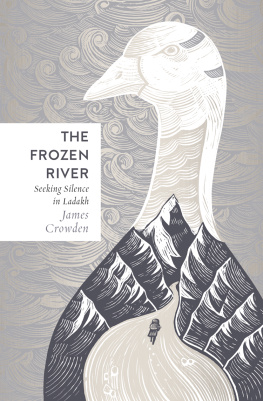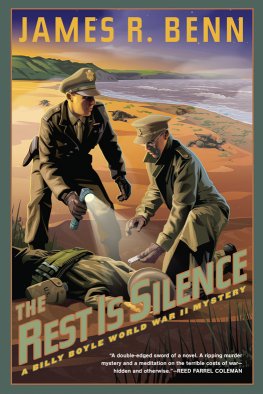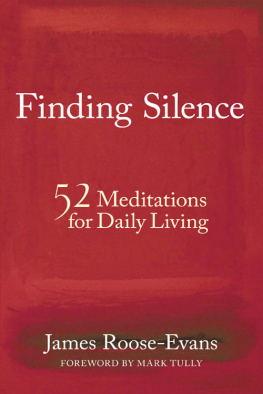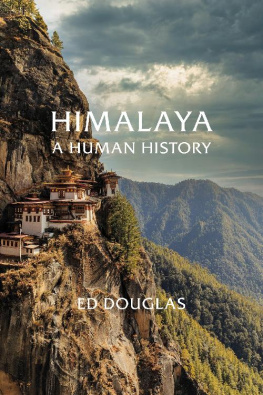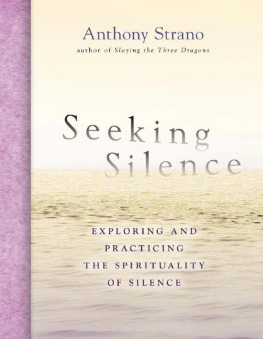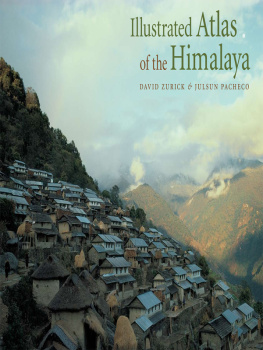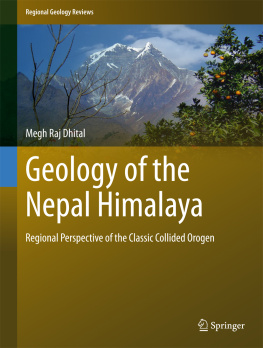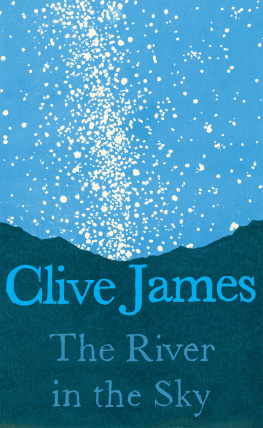James Crowden - The Frozen River: Seeking Silence in the Himalaya
Here you can read online James Crowden - The Frozen River: Seeking Silence in the Himalaya full text of the book (entire story) in english for free. Download pdf and epub, get meaning, cover and reviews about this ebook. year: 2019, publisher: HarperCollins Publishers, genre: Non-fiction / History. Description of the work, (preface) as well as reviews are available. Best literature library LitArk.com created for fans of good reading and offers a wide selection of genres:
Romance novel
Science fiction
Adventure
Detective
Science
History
Home and family
Prose
Art
Politics
Computer
Non-fiction
Religion
Business
Children
Humor
Choose a favorite category and find really read worthwhile books. Enjoy immersion in the world of imagination, feel the emotions of the characters or learn something new for yourself, make an fascinating discovery.
- Book:The Frozen River: Seeking Silence in the Himalaya
- Author:
- Publisher:HarperCollins Publishers
- Genre:
- Year:2019
- Rating:5 / 5
- Favourites:Add to favourites
- Your mark:
- 100
- 1
- 2
- 3
- 4
- 5
The Frozen River: Seeking Silence in the Himalaya: summary, description and annotation
We offer to read an annotation, description, summary or preface (depends on what the author of the book "The Frozen River: Seeking Silence in the Himalaya" wrote himself). If you haven't found the necessary information about the book — write in the comments, we will try to find it.
The Frozen River: Seeking Silence in the Himalaya — read online for free the complete book (whole text) full work
Below is the text of the book, divided by pages. System saving the place of the last page read, allows you to conveniently read the book "The Frozen River: Seeking Silence in the Himalaya" online for free, without having to search again every time where you left off. Put a bookmark, and you can go to the page where you finished reading at any time.
Font size:
Interval:
Bookmark:

William Collins
An imprint of HarperCollinsPublishers
1 London Bridge Street
London SE1 9GF
www.WilliamCollinsBooks.com
This eBook first published in Great Britain by William Collins in 2020
Copyright James Crowden 2020
Jacket illustration Joe Maclaren
Crystal goose image Trustees of the British Museum. All other images the author
James Crowden asserts the moral right to be identified as the author of this work
A catalogue record for this book is available from the British Library
All rights reserved under International and Pan-American Copyright Conventions. By payment of the required fees, you have been granted the non-exclusive, non-transferable right to access and read the text of this e-book on screen. No part of this text may be reproduced, transmitted, down-loaded, decompiled, reverse engineered, or stored in or introduced into any information storage and retrieval system, in any form or by any means, whether electronic or mechanical, now known or hereinafter invented, without the express written permission of HarperCollins.
Source ISBN: 9780008353179
eBook Edition January 2020 ISBN: 9780008353193
Version: 2020-01-20
The valley of the Zangskar River is quite impassable, except when the winters frost makes a road over the waters of the river.
Frederick Drew, 1875

PROLOGUE
The valley
Silence, snow and solitude have got hold of me and will not let go. I am possessed by mountains, cold and ice. Winter has a very firm grip upon my soul. It is like a disease, a form of spiritual possession, mountain fever. And yet there is no escape. I am here for the duration, locked into a little-known Tibetan Buddhist valley at high altitude, sandwiched between the main Himalayan range and the Karakoram.
One by one all the high passes have shut behind me and will not re-open again for six or seven months. The local people, the Zangskaris, spend half their lives huddled round small stoves burning yak dung and tamarisk scrub to keep warm. It is dark in their houses. How they survive and how they live over the winter surrounded by so much snow and ice is still something of a mystery. Only one other Westerner has spent a winter in Zangskar, an eccentric Hungarian linguist called Alexander Csoma de Krs. But that was over 150 years ago, and of the Zangskari winter he left no record.
Imagine if your family had lived in the mountains for a thousand years or more; what effect would that have upon your mind and your thinking, on your awareness and the way in which you perceived things? Imagine how much silence your family would have absorbed and accumulated along the way. Zangskaris try to preserve the teaching about the silence that emerges between words. The teaching is at times very formal but also very subtle, hinting at the space which exists when words run out. And then there is the silence of Dzogchen and the mountains, which cannot really be taught only passed on from teacher to pupil. The language of Buddhism and compassion runs through their daily lives in Zangskar like an invisible thread.
To the south lies the vibrant and colourful Indian subcontinent. To the north, the dry, sandy deserts of Central Asia; to the west, Kashmir, the jagged front line with Pakistan; to the east, the lonely, vast nomadic plateau of Tibet. A place of meditation, debate and monastic scholarship. Zangskar is remote even by Himalayan standards.
Deep silence, deep snow and deep solitude. These are the inner coordinates that matter most to me. For various reasons I have sought out this seclusion, this retreat from the world. Ultimate peace and quiet. Remoteness is a state of mind you either possess it, or you have to go and find it. But once you have found that particular form of solitude and tasted its fruits, you will go back time and time again to touch base with the wilderness and emptiness that live within the mountains. To embrace such mountains is perhaps part of the human condition.
The prospect of travelling down the frozen Zangskar river beckoned just as strongly as the silence of winter. Sleeping rough, sleeping in caves, sleeping out in the snow you live on your wits. One false step, one major crack in the ice or serious slip that catapults you towards the open water and you are lost. The river is fast, deep and cold. A heavy pack drags you down very quickly. A swift end. Zangskar is dangerous in winter.
More than anything else in the world I wanted to make this journey down the frozen river. To the best of my knowledge no Westerner had ever sampled its delights and dangers. Although it was a challenge that I relished, I had much to learn. The mountains were calling in a silent language that I had yet to decipher. I longed for ice and the solitude, but the mountains had many tricks up their sleeve.
The ice road
Sometimes if the ice was clear I could see right through to the very bottom of the river bed where pebbles lay in many colours: grey, rusty brown, black, orange, even mauve. The water had a wonderful greenish tinge. At other times the ice was so thick, strong and opaque that you could almost drive a tank along it. When the ice gets thin the river becomes truly dangerous, wafer-thin ice with hidden whirlpools silently churning away down below. A trap that lies in wait for the unwary.
As you tread upon its surface, the frozen river leaves its indelible mark upon your consciousness. It becomes the mirror of your soul. You develop an inner strength and confidence that stays with you for the rest of your life. A yardstick. A rite of passage. An initiation. Zangskaris call the frozen river chadar: the ice sheet, ice road, ice blanket, frozen one. They respect it. It is a central part of their winter.
You quickly learn to read the ice, taking in old fractures and broken lines at a glance, seeking out inconsistencies that upset the rivers own intention and intrigue. The river is alive with subtle shifts of direction and momentum. Solid currents woven into intricate patterns. Streams of trapped bubbles. Long lines of them, as if a diver were down below. Oval, mirrored, many-layered. Hypnotic. The flow in suspension. Encased in ice. Preserved in aspic, solidified, mute.
The feeling of being trapped in the gorge for days on end is not at all unpleasant. Almost comforting, like being embraced by mountains. There is a sense of expectation that has a certain edge to it, as if trespassing, a frisson shared with cold, sharp, early morning air. You are very alive. Adrenalin kicks in. Your breathing changes, you become aware of every sound. You plumb the depths of the silence. You are not just trapped in the gorge, you are running on a sinuous course that curves and then cuts through a vast mountain range. Geology sliced through, laid bare. Millions of years of sedimentary rocks, twisted, contorted, at times almost vertical, Buddhist time and geological time on a par with each other. You slide, skate and shuffle as if the river is pulling you along. The journey has a momentum all of its own, like running on a silver thread.
When you are on the chadar, the frozen river, everything changes. Your life has different parameters. Your world is narrowed down to this gorge. You become very focused, as all climbers must be. Balance becomes vital. You test yourself against the rock, against the ice, against the frozen river itself. You become tall and confident, attuned to the rivers voice. You learn to read its character by tapping the ice with your stick and patiently listening to the echo, and the echo of the echo, to gauge its solidity, for you are tapping into the rivers own energy, reading its mind as it twists and turns, almost like the mind of a wild animal, predicting the flow of the river under the ice and at certain times the flow of water over the ice. Like sonar or asdic, you wait for the returning ping. Resonance and pitch are vital. Tap, tap, tap. You listen to the echo bouncing back. Each vibration has a fragility. You read the ice visually as well. Each little imperfection registered, logged just in case the levels change. You navigate by the odd stunted juniper tree, small side
Font size:
Interval:
Bookmark:
Similar books «The Frozen River: Seeking Silence in the Himalaya»
Look at similar books to The Frozen River: Seeking Silence in the Himalaya. We have selected literature similar in name and meaning in the hope of providing readers with more options to find new, interesting, not yet read works.
Discussion, reviews of the book The Frozen River: Seeking Silence in the Himalaya and just readers' own opinions. Leave your comments, write what you think about the work, its meaning or the main characters. Specify what exactly you liked and what you didn't like, and why you think so.

